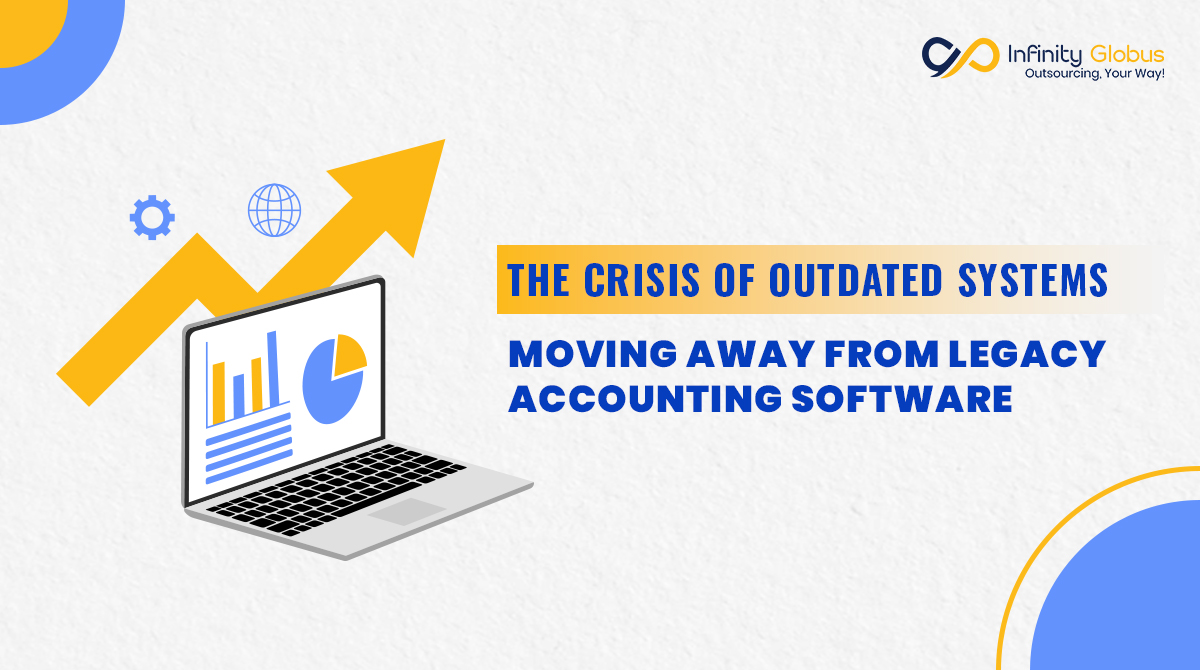
 infinityglobus
infinityglobus
 7 Aug 2024
7 Aug 2024
Once a stalwart of the accounting industry, legacy systems today struggle to meet the dynamic needs of the marketplace. Their inherent limitation in integration, scalability, and data analytics capabilities, which play a pivotal role for any firm, further makes legacy accounting software a big no for the industry.
In fact, according to a report by StreamSets, 51% of data leaders opine that getting data out of legacy systems is one of the biggest obstacles for them in the industry.
Problems like these are thus propelling firms to increasingly move away from outdated systems and embrace more engaging and efficient tools that can help them stay abreast of the competitive accounting realm.
This blog thus explores the urgency of moving away from the legacy system towards more robust, agile, and future-proof accounting solutions for businesses worldwide.
Reasons to Move Away from Legacy Accounting Software
There are several reasons why accounting firms are moving and should move away from legacy accounting software:
Security Issues
Data breaches are a pressing issue that is affecting firms worldwide. In fact, according to the PWCs 2024 Global Digital Trust Insights survey, the proportion of businesses that have witnessed a data breach extending US$1M has increased from 27% to 36% year over year, which is an alarming situation.
Outdated legacy accounting software lacks the latest security features and updates. This makes the system vulnerable to cyber threats and data breaches, which can put sensitive client information at stake and lead to serious repercussions.
Modern systems, on the other hand, are embedded with the latest security measures and follow a compliance framework. This removes vulnerabilities and reduces the chances of breaches.
Inefficient Processes
Legacy software invariably has an inefficient process since it runs on older technology. This leads to slower processing speed, longer turnaround time, and overall reduced efficiency in carrying out day-to-day accounting tasks. Also, since legacy software lacks an automation feature, it can also lead to inaccuracies and manual errors.
Transitioning to modern accounting solutions helps simplify operations and enhance overall productivity.
Poor User Experience
With clunky, unintuitive, and poor navigation, old accounting software tends to possess complex menu structures and navigation paths. Users may need to go through multiple layers of menus to find what they are looking for. This can cause frustration and lead to wasted time. The old software may also have limited customization options, wherein the user might not be able to personalize their workflow to suit their specific needs.
With new systems, user experience is given priority, which improves productivity and enhances user satisfaction.
High Maintenance Cost
Since legacy software tends to be outdated, supporting them can be costly. This happens due to the need for specialized skills, outdated hardware dependencies, and ongoing maintenance expenses. The said problem vanishes when cloud-based modern accounting solutions are employed that have their updates and hence require low maintenance.
Integration and Compatibility Issue
Legacy systems often lack the flexibility to integrate with other systems and hence have compatibility issues. Since accounting firms utilize a plethora of digital platforms to carry out everyday tasks, the absence of integration facilities leads to manual data transfer, which is time-consuming.
On the contrary, new software technologies are built with APIs (Application Programming Interfaces) that facilitate seamless connection with other applications. This helps automate data syncing and aids in enhancing workflows across the firm.
Risk of System Failure
With legacy software becoming obsolete, the risk of system failure becomes more pertinent. From hardware and operating system incompatibility to performance degradation, this outdated systems impact business continuity. Transitioning to modern accounting solutions helps mitigate these risks and safeguards business operations from system failures.
Performance Degradation
With business expansion, data accumulation increases, wherein legacy accounting software struggles to keep pace. This leads to performance degradation, which is often characterized by sluggish response time, and frequent system crashes. These severely impact day-to-day operations and can disrupt business continuity.
New accounting software, on the other hand, is designed carefully to handle large data volumes efficiently, which ensures reliable performance even during heavy workloads.
Final Thoughts
The urgency to move away from legacy software is hence pertinent in today’s dynamic business sphere. The risks and negative upshots related to outdated system usage highlight the necessity for accounting firms to embrace modern accounting software and solutions. By moving towards advanced accounting software, firms can thus improve their operational efficiency and stay abreast of the competitive business realm.
If you also want to make the transition from legacy system, Infinity Globus can turn out to be an ideal choice for you. With years of experience and expertise, we can help you employ modern tools and software that can accelerate the overall growth and business performance of your firm like never before.



